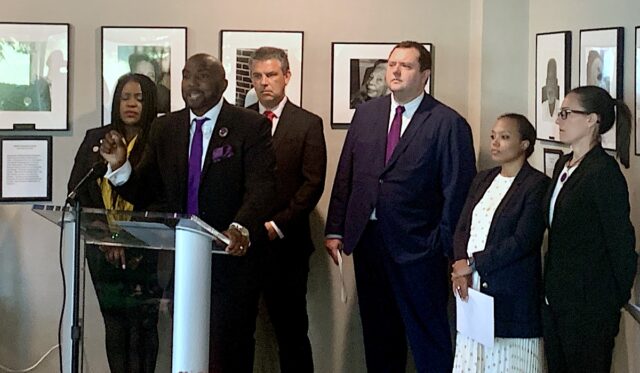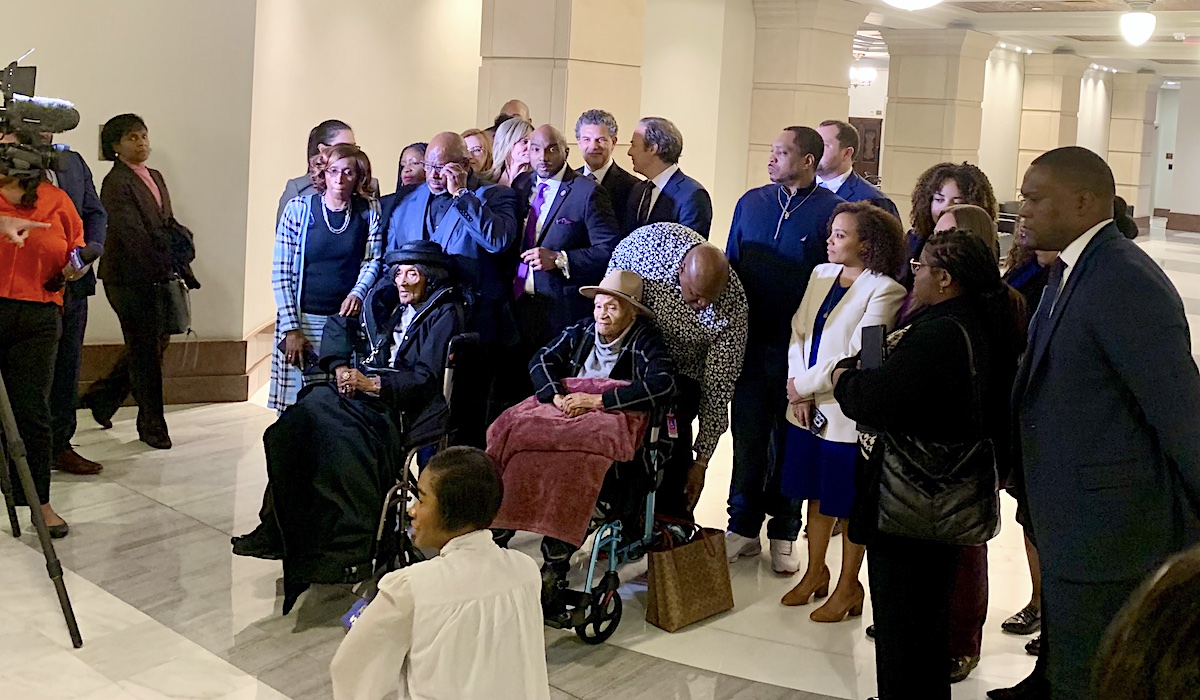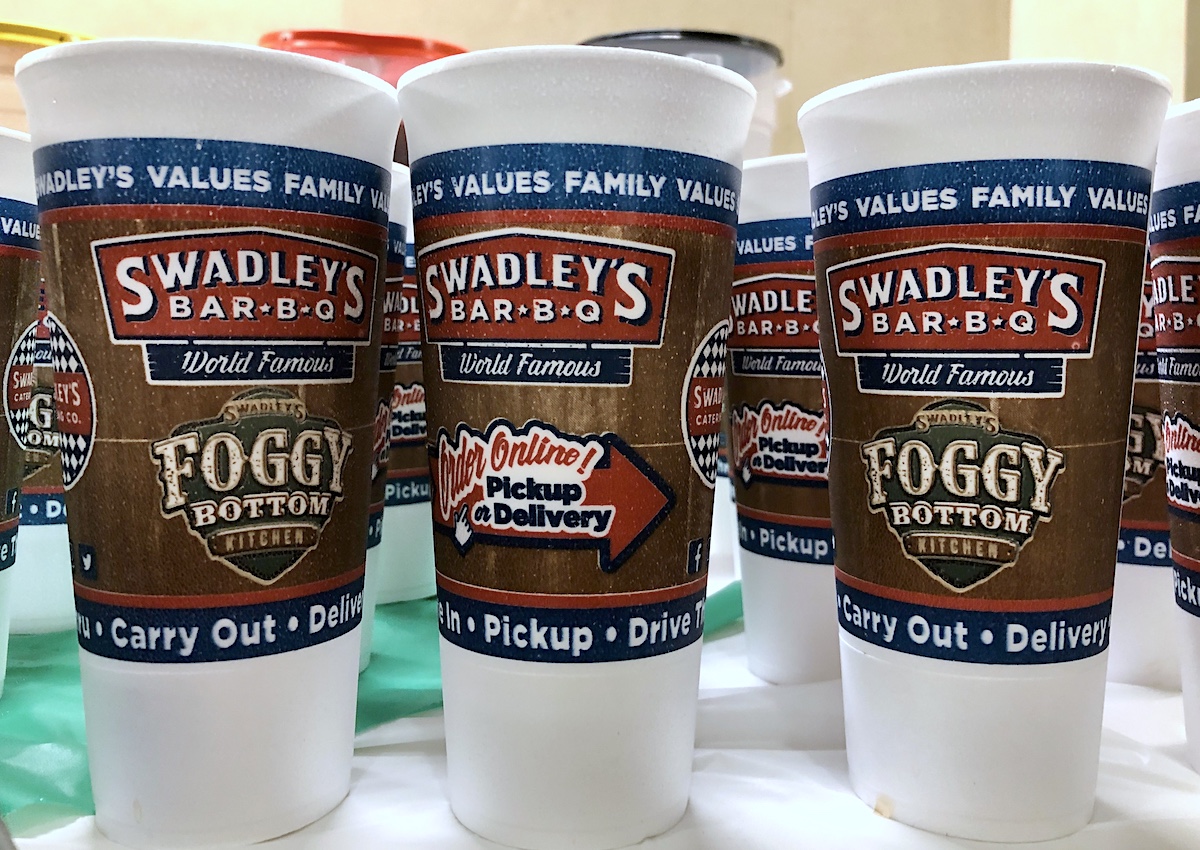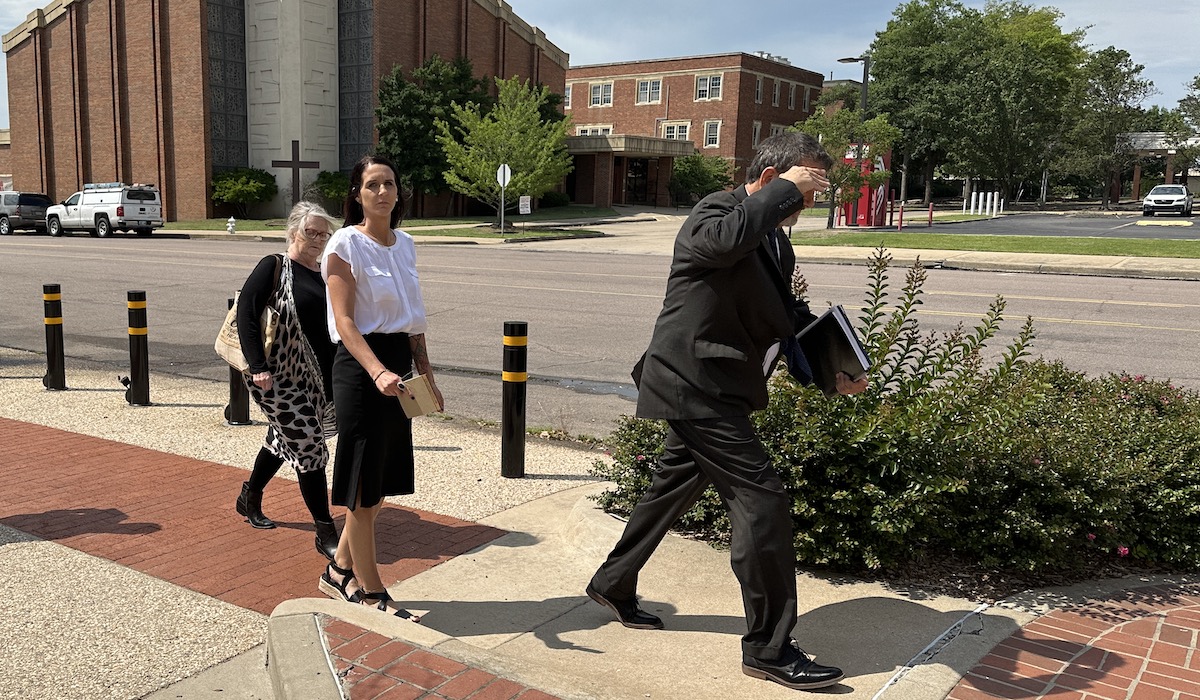

With any luck, your high school social studies teachers explained how the judiciary is the third branch of American government.
Now that the Oklahoma Legislature is (mostly) adjourned for the summer and we have more than a month until the state runoff election, the final workday before Independence Day marks a great time to catch up on court cases and judicial decisions in Oklahoma.
The following roundup outlines developments in a number of cases involving students, immigrants, chickens and more.
Race Massacre survivors seek rehearing, Biden intervention

The last two survivors of the Tulsa Race Massacre filed for a rehearing in front of the Oklahoma Supreme Court today while also calling on President Joe Biden and the U.S. Department of Justice to open an investigation into the 1921 massacre. Last month, Oklahoma’s highest court upheld the dismissal of a civil lawsuit filed by attorney Damario Solomon-Simmons and his law firm on behalf of the final survivors of the massacre, Lessie Benningfield Randle and Viola Ford Fletcher, in an 8-1 decision.
During a press conference in a Greenwood Cultural Center room lined with photographs and stories from survivors, attorney and law professor Eric J. Miller called the Oklahoma Supreme Court’s decision a “historic act of cowardice.”
“The court said the hearing was historic, and it certainly was. It was a historic act of cowardice by the Supreme Court in refusing to grant a hearing on the merits,” Miller said. “Our petition for rehearing is important because it lays out precisely the ways the court has overturned its precedent and misrepresented our arguments to continue its century-long tradition of denying justice to the victims of a race massacre.”
The petition points to two reasons the court should rehear the case. First, it asks the court to allow Randle and Fletcher’s attorneys to amend their unjust enrichment claim to show the defendants — a bevy of government entities and the local chamber of commerce — used “fraud, abuse of confidence, or unconscionable conduct” to fundraise for cultural tourism by misleading donors to believe funds raised would benefit survivors of the massacre.
They allege two examples of fundraising where donors were misled to believe money would benefit Randle while she “was living in poverty.” In 2021, Randle sent a local television station a cease-and-desist letter after the station aired an interview implying she would benefit from millions of dollars’ worth of fundraising.
Filings also allege that an “international recording artist” canceled a fundraising concert after learning only a small portion of the proceeds were slated for each survivor. While court filings do not name the artist, John Legend canceled a fundraising concert in Tulsa in May 2021 during the massacre’s centennial.
The petition also asks the court to reconsider its invocation of the political question doctrine to dismiss their public nuisance claims by arguing that the court had never invoked that doctrine related to public nuisance claims before.
“Relying on the fact that the perpetrators of the massacre are likely dead — and suggesting that this means that society must move past the massacre — is a callous dismissal of who is before the court right now,” the petition states. “Mother Randle and Mother Fletcher are alive and suffering from the ongoing public nuisance the appellees caused.”
Solomon-Simmons also called on Biden to follow through on a promise he made to help survivors “get justice” by intervening. and requesting the DOJ to “open up [an] investigation pursuant to the Emmett Till Cold Case Act.”
“Just three years ago right in this very room my clients Mother Randle, Uncle Red and Mother Fletcher met with President Joe Biden. He sat down with my clients, and he promised them he would see that they get justice. And then he went to the next room and had a robust speech where he told the nation that he stood with survivors and the descendants of the Tulsa Race Massacre,” Solomon-Simmons said. “Well now we’re calling on President Biden to fulfill his promise to the survivors, to this community and to Black people throughout the nation.”
A letter written by Randle and Fletcher also called on the Department of Justice to “intervene and open an investigation into the massacre and do what Oklahoma has never done.”
“It is not too late to do the right thing. We want deeply to believe in the government’s power to do right by Black Americans and to focus its power and attention on righting the wrongs inflicted upon our communities,” the two centenarians wrote. “We hope we are around to see it.”
Judge: Agriculture Department must give notice, hear concerns on large poultry farms
The Oklahoma Department of Agriculture, Food and Forestry must examine potential pollution issues when considering permits for large poultry operations, a Delaware County judge has ruled.
Associate District Court Judge Dave Crutchfield also ruled in his partial summary judgment that the agency must provide opportunities for public input on poultry megafarms, which contain between 125,00 and 300,000 chickens.
Issued Friday, Crutchfield’s order said the Agriculture Department is “restrained from accepting, granting or otherwise sanctioning any registration, permit, license or authorization” for the construction of large poultry operations containing more than 125,000 chickens until the agency:
- Provides written notice to all landowners within a one-mile radius 90 days before any construction is to start;
- Publishes at least two times — and not less than 14 days apart — a notice about a large poultry farm being built; and
- Provides meaningful consideration of public concerns regarding the environmental effects of air emanating from a poultry farm, sources and uses of water at a poultry operation and disposal of all waste and litter generated at a poultry facility.
Crutchfield directed the Agriculture Department to give landowners and the public written notice about any application to renew, register, permit, license or authorize a large poultry farm that was submitted before his ruling. He also directed all parties to develop a form that addresses an application to renew a registration, permit, license or authorization of a large poultry farm that is submitted after his ruling.
If Crutchfield’s order stands and is not overturned on appeal, the new form would be subject to his approval.
Matthew Alison, an attorney with the Indian and Environmental Law Group in Tulsa that filed the lawsuit on behalf of the Spring Creek Coalition, said Friday’s court ruling eliminates “convenient finger pointing” between the Agriculture Department and the state’s environmental agencies when it comes to air and water pollution concerns that landowners and others have about large poultry operations.
“The judge’s order clarifies that ODAFF was wrong when it denied it had responsibility and ODAFF was wrong when it said it didn’t have jurisdiction to consider the public’s concerns,” he said. “And years later, now we begin the process of unwinding that dereliction of responsibility. (…) Now marks the beginning of when ODAFF is compelled to consider environmental factors, consider public health, consider air quality and water quality that it’s never done before.”
Asked if the Agriculture Department had a response to Crutchfield’s ruling, Lee Benson, public information officer for the agency, said, “ODAFF still considers this case to be in litigation.”
Rodd Moesel, president of the Oklahoma Farm Bureau, called the ruling that changes the permitting process for poultry producers an “extreme case of judicial overreach.”
“Oklahoma’s poultry growers are family farmers who live and work in the rural Oklahoma communities in which they raise poultry, and this burdensome and costly rigamarole serves only to drive up food prices in a time of skyrocketing inflation, making it harder than ever for Oklahomans to access healthy and affordable protein,” Moesel said in a statement. “The judge in this ruling has acted not just as the judicial branch, but all three branches of government — dictating legislation and administrative rulemaking from the bench, which only results in a lack of confidence in Oklahoma’s democracy. Oklahoma farmers and ranchers strive to comply with the law, but we believe the law should be prescribed by the legislative branch — not the judicial branch.”
This spring, Moesel and the Farm Bureau helped lead efforts to pass Senate Bill 1424, which limited liability for parties involved in land applications of poultry waste under state-approved nutrient management plans. The bill, which also increased penalties for violation of such plans, was supported by poultry producers and agriculture groups concerned by past litigation against the industry.
Spring Creek Coalition, a nonprofit formed in 1994, filed their Delaware County lawsuit in 2021 against the Agriculture Department. The group, which describes its members as landowners, residents and supporters of the Spring Creek Watershed in northeast Oklahoma, did not sue operators of the poultry farms but instead listed them as interested parties. The operators are Michael Phan, Chau Tran and Donna Nguyen, Tong Nguyen, Ming Ngo, Loa Vo, and Tran and Tran LLC.
“What the coalition has wanted from the beginning is administrative consideration and oversight of these facilities with the concerns as a matter to the public, like environmental protection, water quality, water quantity, air quality and public health,” Alison said.
Spring Creek flows across the Cherokee Nation Reservation and through three counties before emptying into Fort Gibson Lake. For two decades, Oklahoma has been engaged in separate, long-running litigation regarding poultry litter application pollution in the Illinois River, about 30 miles southeast of Spring Creek. Improving phosphorous levels in northeast Oklahoma watersheds have been accompanied by growth in the area’s poultry industry.
Eight large poultry farms were identified in the lawsuit brought by the Spring Creek Coalition.
“Those are only within the Spring Creek watershed, only within Delaware County,” Alison said. “There’s a bunch more in Delaware County. There’s a bunch more in the Spring Creek watershed that aren’t in Delaware County.”
The Spring Creek Coalition’s lawsuit contends that the Agriculture Department does not allow opportunities for public input regarding the poultry operations, which they allege is a violation of due process. The Agriculture Department, in a motion to dismiss the lawsuit, said the coalition lacked standing to bring the litigation.
Crutchfield, in his ruling, noted the U.S. Department of Environmental Quality gave authority to the state of Oklahoma to implement the Clean Water Act and other federal regulations when issuing permits. The Agriculture Department is the agency that deals with permits for Concentrated Animal Feed Operations. For poultry operations, a CAFO is a facility that contains at least 125,000 chickens, so long as it uses other processes than a liquid manure handling system.
Crutchfield said the Agriculture Department admitted the poultry facilities are CAFOs under federal definitions but are not considered as such under Oklahoma statutes.
“The potential for pollution, arising out of the confined feeding of hundreds of thousands of chickens, should be ‘intuitively obvious to the most casual observer’ (a phrase used by Admiral Hyman G. Rickover, USN when describing things of an obvious nature),” Crutchfield wrote. “Litigation over the cumulative effects of poorly regulated poultry operations in northeast Oklahoma has been going on for decades.”
Drummond seeks preliminary injunction against new Title IX rules

On Friday, Oklahoma Attorney General Gentner Drummond filed a motion for a temporary injunction to prevent the U.S. Department of Education from enforcing new Title IX rules dealing with protections for LGBTQ students.
Although a federal judge in Louisiana already granted a temporary injunction against the new rules, that ruling only prevented enforcement in Louisiana, Montana, Idaho and Mississippi.
“The U.S. Department of Education is attempting to rewrite the historic goals and fundamental requirements of Title IX,” Drummond wrote in his request’s introduction. “The department (…) seeks to fundamentally alter the protections afforded to women under Title IX by inserting ‘gender identity’ into the framework for determining, among other things, access to a restroom and a student’s eligibility to participate on a sports team.”
Drummond originally filed the lawsuit against the DOE on May 6, the same day State Superintendent of Public Instruction Ryan Walters filed his own lawsuit against the rules in the same federal district court. While Drummond’s lawsuit has progressed in a typical manner — the defendants being served with the suit slightly more than two weeks after it was filed — Walters has not even served the defendants with the suit yet despite filing it nearly two months ago.
Drummond’s request for a preliminary injunction filed Friday comes in addition to his initial request that the court declare the new rules unlawful.
Injunction pauses immigration bill; Drummond promises appeal

A federal judge for the Western District of Oklahoma granted a preliminary injunction putting a controversial state immigration law on hold Friday. The order in United States v. Oklahoma found that federal attorneys were likely to succeed on the merits of their case and that allowing House Bill 4156 to take effect would likely cause “irreparable harm.” The U.S. Department of Justice filed suit in May challenging the law under principles of federalism.
Judge Bernard M. Jones, a 2019 appointee of President Donald Trump and a former Oklahoma County District Court judge appointed by Gov. Mary Fallin in 2012, wrote the order preventing state officials from enforcing an immigration law that would have criminalized entering and remaining in Oklahoma without “legal authorization.” The bill also requires that individuals convicted of violating the law leave the state. When granting the injunction, Jones wrote that federal law likely preempted Oklahoma from enforcing its own separate immigration policy.
“However well-intentioned, HB 4156 authorizes state prosecution for conduct already subject to comprehensive federal regulation and bound within federal immigration policy. If permitted to stand, each state could give itself ‘independent authority’ to achieve its own immigration policy, undoubtedly ‘diminishing the federal government’s control over enforcement’ and ‘detracting from the immigration scheme of regulation created by Congress,” Jones wrote. “While this court may be sympathetic to the concerns raised by Oklahoma, such concerns should not — and, indeed, cannot — be allowed to undermine the long-standing, comprehensive federal framework that defines immigration policy.”
Jones was unconvinced by Oklahoma’s argument that the state had an inherent right to protect itself from an “invasion” of immigration under the state war clause and pointed to the failure of that same argument when invoked in defense of a similar law passed in Texas.
“The Western District of Texas performed an extensive analysis of the historical and constitutional context of the state war clause, concluding in detail that the surge in unauthorized immigration did not qualify as an ‘invasion’ under the Constitution,” Jones wrote.
Attorney General Gentner Drummond, who helped craft the bill’s language in an effort to avoid legal challenges, promised to appeal the ruling.
“The Biden Administration’s complete failure to enforce federal immigration laws made House Bill 4156 a necessity,” he said. “We intend to appeal today’s decision and defend one of the most powerful tools we have to fight the criminal activity largely being fueled by illegal aliens in Oklahoma.”
ACLU of Oklahoma executive director Tamya Cox-Touré said she was “grateful for the relief this provides to Oklahoma families.”
A similar request for an injunction by Padres Unidos de Tulsa, filed on behalf of the ACLU, was denied as moot after their lawsuit was consolidated into U.S. v. Oklahoma. Jones also denied a request to file an amicus brief from the Immigration Reform Law Institute, an anti-immigration law firm based in Washington.
UCO pledges ‘equal treatment’ to settle Title IX lawsuit

On Monday, U.S. District Court Judge Joe Heaton issued an order approving a class action settlement in a Title IX lawsuit brought against the University of Central Oklahoma.
The settlement agreement requires UCO to provide female student-athletes “with equal treatment and opportunities,” hire a third-party expert to review its athletics programs and craft a gender equity plan to comply with Title IX law, according to a press release from the Bailey Glasser law firm.
UCO must also provide “equipment, supplies, transportation, publicity and practice schedules equal to those provided to men’s varsity teams,” according to the release. The lawsuit, filed in 2022, was brought after members of the female track and field team noted the university did not provide the same benefits and treatment it offered to male teams.
“The women’s indoor track and field, outdoor track and field, and cross-country teams at UCO — unlike any men’s teams — were provided no locker room, no competitive facility, and required to practice at a local middle school,” the press release states. “When they complained about the unequal treatment they and other women athletes received, UCO fired their head coach.”
Tatum Robertson, a member of the team and plaintiff in the suit, said the lawsuit should “never have been necessary.”
“We are delighted that UCO is finally going to stop discriminating against its women athletes and give them the equal treatment, benefits and opportunities the law requires,” Robertson said in the release.
Heaton’s order stated that the settlement agreement shall remain in effect through July 31, 2028. He will determine court costs and attorney fees at a later date.
“UCO supports the court’s approval of the settlement agreement and looks forward to implementation that will occur over the term of the agreement,” said Adrienne Nobles, UCO’s vice president of communications and public affairs.
In civil suit, state tries to disqualify Swadley’s attorneys

The state of Oklahoma wants to disqualify attorneys for Swadley’s Foggy Bottom Kitchen in the breach of contract civil lawsuit it filed in April 2022. In a filing Monday, state attorneys alleged conflicts of interest involving access to transcripts from the grand jury that indicted company owner Brent Swadley and officers Curt Breuklander and Tim Hooper.
Swadley and the others were charged in February with 10 felony counts ranging from presenting false or fraudulent invoices to directing suppliers also to create false invoices.
In 2022, the state sued Swadley’s to recover $5 million from the company after the Legislative Office of Fiscal Transparency had investigated allegations of inflated invoices for work done on state park restaurants. Swadley’s also filed a motion claiming the state owed $2.6 million to the company for services during its contract to run Foggy Bottom restaurants in state parks beginning in 2020.
Now, the Oklahoma Attorney General’s Office is arguing that, because the civil and criminal cases are technically different adjudications, the need to keep grand jury transcripts confidential creates a conflict of interest for Swadley attorneys. The state argues that two pairs of attorneys at the same law firm cannot separate their knowledge of the transcripts in the criminal case from their representation during the civil case. State law heavily restricts the use of those transcripts, and the AG’s office said such practice would also violate ethics rules.
The Attorney General’s Office said in its filing Monday that it set up an internal “screen” so criminal and civil attorneys prosecuting Swadley’s related cases never have access to each other’s files and that Swadley’s attorneys should have done that, too.
Preliminary hearing dates for the three criminally charged Swadley’s defendants are set for October.
Hearing set for Dan Kirby sentencing

More than a year after he was convicted of involuntary manslaughter for the death of his girlfriend, former legislator and former Eufaula City Councilman Dan Kirby is scheduled to be sentenced Monday, July 29.
Kirby, a citizen of the Muscogee Nation, wrecked his motorcycle in Lake Eufaula State Park in July 2022 while his girlfriend, Sheryl Bichsel, was riding on the back. Kirby was uninjured, but Bichsel — a Choctaw Nation citizen — died.
Because Kirby is a tribal citizen, only the Muscogee Nation and the federal government had jurisdiction over the situation. Kirby was tried over the course of three days in June 2023 in the U.S. District Court for the Eastern District of Oklahoma, and jurors found that Kirby was intoxicated to the point of impairment when the fatal wreck occurred.
In 2017, Kirby resigned while facing expulsion from the Oklahoma House of Representatives for sexual harassment allegations. He had been a representative since 2008. In April 2021, Kirby won election to the Eufaula City Council. After he was indicted in February 2023, he resigned from his city council position.
Summer Boismier civil trial set for 2025

A federal judge in the U.S. District Court for the Western District of Oklahoma has set a jury trial date for Summer Boismier’s defamation case against State Superintendent of Public Instruction Ryan Walters for June 10, 2025.
The trial date means both parties will have slightly less than a year for discovery as they craft arguments debating whether Walters actually defamed the former Norman High School teacher.
Boismier resigned from her position just days into the 2022-2023 school year after a parent complained about Boismier covering her classroom library with red butcher paper and writing on it, “Books the state doesn’t want you to read.” Boismier also posted a QR code in her classroom that linked to the Brooklyn Public Library’s Books Unbanned project.
Since he has been in office, Walters has relentlessly pursued revocation of Boismier’s certificate, which expired on its own June 30, but that did not stop State Board of Education members from continuing to pursue revocation at their June 27 meeting by scheduling another hearing for their July meeting.
Former Oklahoma County Election Board alternate sues state
Jenni White, who was removed by members of the State Election Board as the alternate Republican on the Oklahoma County Election Board, has filed a federal lawsuit in the Western District of Oklahoma against the three-member board and the agency’s executive director claiming her dismissal violated her First Amendment rights.
The State Election Board voted unanimously Jan. 31 to remove White for failing to perform her duties and exhibiting behavior unbecoming of an election official. White said in her lawsuit that she mentioned on her podcast that election procedures were violated when Oklahoma County Election Board members were not present in the room where absentee ballots were being counted during special elections in September and October.
Instead, she said, board members were observing the count, which was being done by election board employees, only by closed-circuit television. White is seeking actual and nominal damages because she claims her removal caused emotional distress and reputational harm.




















